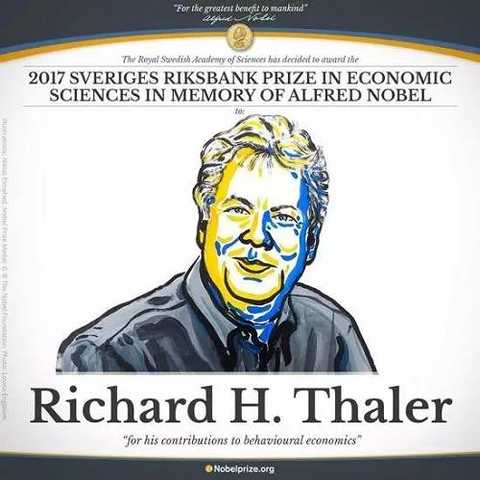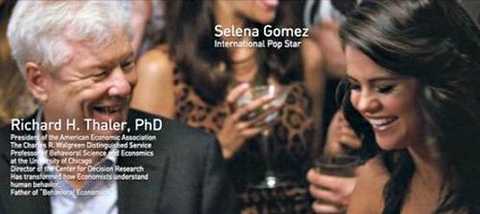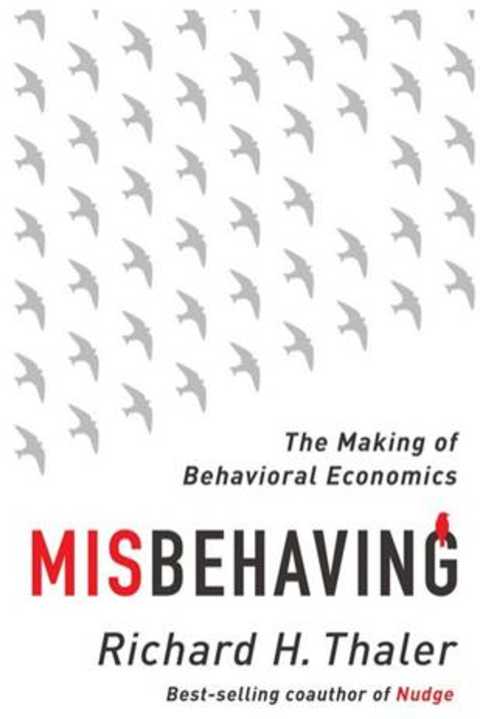This article was first published on WeChat public account: Huazhang Finance. The content of the article belongs to the author's personal opinion and does not represent the position of Hexun.com. Investors should act accordingly, at their own risk. Source: People and gods work together, sort out self-thoughts, see Wall Street, apply psychology When you have one thing, you will evaluate it better than if you didn't own it. ——The Nobel Prize in Economics, Professor Richard Seiler’s Theory of Endowment Effect This year's Nobel Prize was awarded to Behavioral Economics The happiness of possession, and the pain of losing it, which one is bigger? What kind of mentality is "afraid of trouble"? Why are poor people poorer and rich people richer? These seemingly inconspicuous problems, in fact, have the same psychological effect behind the endowment effect. This theory was first proposed by Professor Richard Thaler, who just won the Nobel Prize in Economics. As the founder of behavioral economics and one of the most influential scholars in the field of decision-making psychology, many of the contents of this "decision-making psychology" series are related to his research. To understand the "endowment effect" introduced today, we must first understand another more basic concept in "behavioral economics" - "loss aversion." If you work very hard and work overtime every night, in order to encourage you, the leader will make a special report and get a raise for you. However, by the end of the year, you have worked hard for a year, but you have nothing. You must be very disappointed. In fact, you have nothing to lose! There are a lot of people who work hard but don’t get a raise. Why are people not so disappointed with you? Why is your mood worse than if nothing happened after an imaginary "recovery?" The economist explained this: Suppose that the "satisfaction value" when you go out to work this morning is 100. Suddenly, you get a big wallet with 100 yuan in it, and the "satisfaction value" rises rapidly by 50%. 150. However, the music is very sad, you are late, deducting the salary of 100 yuan, the "satisfaction value" fell by 50%, becoming 75. There is no change in money, but the "satisfaction value" has changed from 100 to 75. Some people will say that there is a problem with this calculation. Why is the "mood satisfaction value" not a certain value? If you calculate it, there will be no change in "getting it wrong." This asks the idea. For example, the same is the price of 100 yuan. A millionaire and a beggar feel completely different. What we have is the starting point of our value judgment. Therefore, the change of "mood satisfaction value" is not to add or subtract a certain value, but to multiply and divide a ratio. Just like we took 10,000 yuan of stocks, lost 10%, and then earned 10%, it became 9900 (and vice versa), and lost 100 yuan out of thin air. The above example proves one of the most important theories in the "investment decision psychology" - "loss aversion": The happiness of getting one thing is usually less than the pain of losing one thing, so we don't like adventure, we prefer to give up the happiness we have to maintain the status quo, and we are not willing to suffer the pain of loss. So Laozhuang philosophy tells us not to pursue those things that are valuable... Far away. We just said that the premise of “loss aversion†is “the feeling of fear of losing after possessing one thingâ€, which implies a hypothesis that your judgment of the value of what you have is often irrational. Richard Seiler's "endowment effect" proves this hypothesis. æ•å¸šè‡ªç's "endowment effect" If you have two jobs at the same time, the other conditions are the same. The only difference is that a job is 1,000 yuan higher and the other is five days a year. You feel that both jobs are acceptable. In economic terms, the 1,000-dollar salary and the 5-day annual leave have the same effect. One of them first called you to inform you that you readily accepted and began to live after the job. After a while, another person called you. At this point, you will refuse in all likelihood. Although a few minutes ago, you still felt that there is no difference between the two, but when you accept the first job, the utility of the 1,000 yuan salary you already have increased, which is greater than the five-day annual leave you did not get. Professor Richard Seiler said that this is the “endowment effectâ€: when you have one thing, you will evaluate it better than if you didn’t own it. The "endowment effect" is caused by the "loss aversion" mentality, because the pain of "losing this 1,000 yuan salary" is greater than the happiness of "getting 1000 yuan" (equivalent to five days of annual leave). Professor Richard Seiler asked: Does the "æ•å¸šè‡ªç" tell you why this change has occurred? The students thought for a moment and said, "In fact, it is not a matter of 'Zhu Zizhen'. It is afraid of trouble and does not want to change your decision." Professor Richard Seiler is learning after all, and likes to pursue it: "What does it mean to be afraid of trouble? Is it the cost of choice? Do we call a phone call and say, 'I accepted another Work 'pays a big price?' In fact, when the "endowment effect" allows us to make irrational choices, "fear of trouble" is just an excuse. If you don't understand that you don't want to change the status quo because of the irrational behavior of the endowment effect, but just understand it as "fear of trouble," then, when the other party gives you a day off in order to fight for you, you are likely to still Will refuse. Change this example. When faced with a job with a salary increase of more than 30%, you will not hesitate to choose to change jobs; but if you only have a 10% increase, you will usually consider the "job cost". For the "endowment effect", we will overestimate the value of the current work, thus exaggerating the "job cost." So, what is the actual cost of “jumpingâ€? Professor Richard Seiler did an experiment when he explained the "endowment effect." He divided the students into three groups. The first group was to sell a coffee cup, the second group was to buy a coffee cup from the seller, the third group was free to choose, own a cup or get a sum of money of the same value. Then let the three groups of people separately price the coffee cup. The result is that the median valuation of the second group of buyers is $2.87, which is very close to the third group of freely selectable students valued at $3.12. The median estimate of the seller is $7.12, which is doubled. Once again, it proves the “endowment effect†of “what is there and what is overestimatedâ€. In many experiments by economists such as Richard Seiler, there has been a ratio of about 2:1, so the "loss aversion coefficient" of the "endowment effect" is obtained - 2 times the happiness gained can offset the same loss. pain. Use this factor to explain the previous example. After you have agreed to the job of 1000 yuan, the other one will give you 8 days of annual leave (instead of the original 5 days) to make you change your mind. If a job-changing opportunity with a 10% salary increase will make you hesitate (meaning that the two jobs are equally effective), then the "job-shifting cost" is actually only 5% of the salary. Why are poor people poorer and rich people richer? Richard Siller explains this: Because you know that money is spent on spending, and businesses are clear that goods are sold for, so there is no “endowment effectâ€. Conversely: when you have a sense of ownership of money, you can't reasonably face the "spending money" thing. The poor's money is used to support their livelihoods, so the poor often have a sense of ownership of money, which creates an endowment effect. The pain of spending 100 yuan is greater than the happiness of getting 100 yuan of goods; the things that I like are out of stock, and I feel relieved. On the contrary, the rich are used to "money money", and they keep coming in and out, and there is no psychological burden of "endowment effect." The money, once stopped flowing, will quickly depreciate. Therefore, the world is often poor and poor, and the rich are richer. Similarly, in the eyes of newcomers to do business, goods and money are two things, goods that are not sold well, and you let him make a fold like cutting his own meat. But in the eyes of business veterans, they are all different forms of wealth. Therefore, they pay more attention to the speed of capital turnover, and do not hesitate when the clearance sale. In an old saying: If money is used, you have its true value. “Speak to yourself, if you are someone else, are you willing to work with yourself?†"I don't even think about it, how can I have such a good blessing..." Although the above is a paragraph, but the "endowment effect" does allow us to make a lot of "ass to decide the head" irrational judgment. Have you ever thought that certain ability is not as good as you, but promotion and salary increase are always one step faster, because "that person will flatter"? Do you use someone else's plan for the leadership, and let your week's efforts go to the flow and get angry? Do you think your plan is obviously better than others's, is the leader blind? When we are in the role of "seller", do we overestimate our role? Are we too embarrassed when we are in the role of "buyers"? Knowing the existence of the "endowment effect", your judgment should be more objective, and the mentality should be more mature. He was not accepted by the mainstream economics community. In the early days, Siller was not recognized by mainstream economists and was often rejected by well-known journals. When Seiler achieved a prestigious faculty at the University of Chicago, the Nobel laureate and Merton Howard Miller, a professor of economics at the University of Chicago, was quite dissatisfied. He was asked why he did not block the appointment. Said: "Every generation will make their own mistakes. Once again, the founder of law and economics and the federal judge Richard Allen Posner listened to Seiler's speech, but ended up yelling: "You are completely in violation of science!" The scene was quite embarrassing. However, Sele's academic achievements prove that he is not crazy. In 2015, Seiler served as chairman of the American Economic Association, including the famous economist Milton Friedman who also sat in this position. The old urchin Seiler also had a guest appearance in a movie, in the Oscar's best adaptation of the screenplay award-winning film "The Big Short", went to Las Vegas casino with Selena Gomez Explain to people what is a “guaranteed debt certificateâ€. It is not uncommon for economists like Salle to be “deviant†in this school. One of the co-authors of the "Devil's Economics" series, which is considered to be a research field, is also an economist, Steven Levitt. What is the "wrong" behavior in Seiler's eyes? Currently, Seiler is also a consultant to the UK government's Nudge Unit, a government agency that aims to develop policies that help citizens make better choices to improve public welfare. The booster project is a high-quality attempt to apply psychology theory and results directly to change and optimize reality, and Siller is indispensable. In his book, there is a book entitled "The Mistakes", in which he once exemplified a wrong act he observed during his time as a professor at the University of Chicago. He set the total score at 100 points, while the average score for the class was only 72 points. Although his purpose was achieved, the students were angry because of their seemingly small scores, complaining that the teacher was too difficult to ask questions. Later, he slightly revised the scoring rules and jumped the total score to 137 points. At this time, the average score of the whole class mentioned 96 points. The students are very happy! Even if the difficulty of the test paper has not changed (it is still so difficult), there is no difference in the distribution of scores. Only the score of the absolute value of the score is improved, and no student complains that the test is difficult. This is an interesting "wrong" response for Seiler. Students should study hard to increase their knowledge and solid basic skills, but in the end, they just satisfied with a little improvement. For Seiler, his practice of increasing the score is to give the students a dose of morphine needle: paralysis Their knowledge of the real situation. In addition, Seiler's reading suggestions for this book are also related to his understanding of the mistake: "When you feel that it is no longer interesting, don't read it anymore. Otherwise, it is the so-called 'wrong' behavior." Since 2002, Siller has been nominated for the Nobel Prize many times, but has repeatedly missed. Everyone is very anxious and thinks that Seiler will miss Novell, and this year he finally got his wish. more than 10 Years manufacture experience,Quality and delivery time guaranteed,Price and Service Supplied
Polyester twisted rope is highly resistant to ultra-violet rays, stays flexible and does not shrink or harden,does not float .Low stretch, abrasion resistant. Spliceable. Resists chemicals.
Yangzhou Conas International Trade Co., Ltd. is a professional factory which is hammer at develop, produce and sale rope
It implements the business philosophy of [integrity management, customer first" and always provides customers with good products and technical support, sound after-sales service, and high-quality products.
Polyethylene String,Polyethylene Cord,High Modulus Rope,Hollow Braid Polyethylene Rope Yangzhou YILIYUAN Rope & Net Factory , https://www.yzknsmy.com
Loss aversion: Ningyuan can't get it, don't want to lose it 
Life is so tragic: you have a happy relationship, must be less than the pain of falling out of love; getting a child's happiness must be less than the loss of this child's pain... 
Next to the Chinese students began to interject, this is a theory, the Chinese summed it into an idiom more than a thousand years ago: æ•å¸šè‡ªç. 
2 times the happiness gained can offset the pain of loss 
However, someone raised a very interesting question: When I took out 500 yuan from my wallet and bought a pair of shoes with a price of 500 yuan, why did I not have an "endowment effect" on the five banknotes I own? Why, the seller did not have an "endowment effect" on his shoes? 
The irrational judgment of the ass determines the head 
Suzler’s Booth School of Business is also worth mentioning. Its tolerant academic atmosphere is also the result of Seiler’s almost “unreasonable†economic research, which is the main thrust of such a privilege. 
University professors need to design their own exam questions, and he makes the exams difficult, aiming to divide the students in one class into three groups.